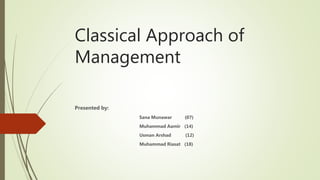
Classical Approach of Management
- 1. Classical Approach of Management Presented by: Sana Munawar (07) Muhammad Aamir (14) Usman Arshad (12) Muhammad Riasat (18)
- 2. Definition of Classical Theory “Classical approach of management professes the body of management thought based on the belief that employees have only economical and physical needs and that the social needs & need for job satisfaction either does not exist or are unimportant” Accordingly it advocates high specialization of labour,centralized decision making & profit maximization.
- 3. Classical Theory Classical approach is the oldest formal school of thought which began around 1900 and continued into the 1920s. Its mainly concerned with the increasing the efficiency of workers and organizations based on management practices, which were an outcome of careful observation Classical approach includes scientific, administrative & bureaucratic management.
- 4. 1) Scientific Management Theory This theory was propounded by Frederick Winslow Taylor. Taylor believed that by analysing work in a scientific manner, it was possible to find the one best way to perform a task. He felt that by organising work in the most efficient way, the organisation's productivity would be increased, allowing it to reward employees with additional remuneration, which Taylor argued was employee's only motivation.
- 5. 2) Bureaucratic Management Theory Bureaucratic Theory was developed by a German Sociologist and political economist Max Weber (1864-1920). According to him, bureaucracy is the most efficient form of organisation. The organisation has a well-defined line of authority. It has clear rules and regulations which are strictly followed.
- 6. 3) Administrative Management Theory The first expert of Administrative Management Theory was Henri Fayol (1841- 1925). Fayol is called the "Father of Modern Management". According to the Administrative Management Theory / School, management is the process of getting things done through people. Here importance is given to groups and not to individuals.
- 8. Features of Classical Theory Management is viewed as a systematic process of interrelated functions. Principles of management are used as a guideline for the executives. Functions , Principles and skills of management are universal. Formal education and training is needed for the development of the required skills. Emphasis is placed on the economic efficiency. People are motivated by economic gains and other incentives. Classical theory pillar mainly stands on three pillars :Bureaucracy, Scientific management and Administration. Though this approach provides Specialization, structure, rationality, predictability and democracy but at the same time a lot of paperwork , compartmentalization of work, rigidity and Goal displacement is there.
- 9. Strengths of Classical Theory Hierarchical Structure: One of the advantages of the classical management structure is a clear organizational hierarchy with three distinct management levels. Each management group has its own objectives and responsibilities. Division of Labour: One of the advantages of classical management approach is the division of labour. Projects are broken down into smaller tasks that are easy to complete. Employees' responsibilities and expectations are clearly defined. This approach allows workers to narrow their field of expertise and to specialize in one area.
- 10. Strengths of Classical Theory Monetary Incentive: According to classical management theory, employees should be motivated by monetary rewards. In other words, they will work harder and become more productive if they have an incentive to look forward to. This gives management easier control over the workforce. Autocratic Leadership: The autocratic leadership approach is the central part of classical management theory. It states that an organization should have a single leader to make decisions, to organize and direct the employees. All decisions are made at the top level and communicated down.
- 11. Weaknesses of Classical Theory Untested assumptions: Many of the assumptions made by classical writers were based not on scientific tests but on value judgments that expressed what they believed to be proper life-styles, moral codes, and attitudes toward success. Failure to consider the informal organization: In their stress on formal relationships in the organization, classical approaches tend to ignore informal relations as characterized by social interchange among workers, the emergence of group leaders apart from those specified by the formal organization, and so forth.
- 12. Weaknesses of Classical Theory Human machinery: Classical theories leave the impression that the organization is a machine and that workers are simply parts to be fitted into the machine to make it run efficiently. Thus, many of the principles are concerned first with making the organization efficient, with the assumption that workers will conform to the work setting if the financial incentives are agreeable. Static conditions: Organizations are influenced by external conditions that often fluctuate over time, yet classical management, theory presents an image of an organization that is not shaped by external influences.